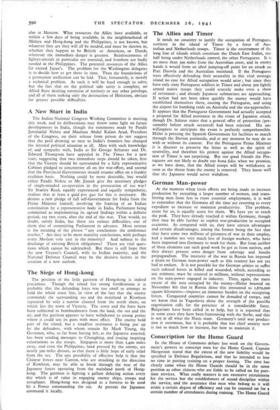German Man-power
At the moment when fresh efforts are being made to increase production by recruiting a larger number of women, and trans- ferring men from less to more essential employment, it is well to remember that the Germans all the time are resorting to every expedient to increase or maintain productivity. The problem, acute for us, is equally acute for them. We have yet to reach the peak. They have already reached it within Germany, though they may be able further to exploit war-production in occupied countries. As compared with us, they have certain advantages and certain disadvantages, among the former being the fact that they have some two millions of prisoners of war in their employ, and a number not very much less of foreign workers, who have been imported into Germany to work for them. But from neither of these elements can such good work be got as from natives, and they always present some danger from sabotage and hostile propagandism. The intensity of the war in Russia has imposed a drain on German man-power such as this country has not yet had to endure. It is not possible for the German armies to suffer such colossal losses in killed and wounded, which, according to any estimate, must be counted in millions, without repercussions on the man-power engaged in industry. Then, again, the mere extent of the area occupied by the enemy—Hitler boasted on November 8th that in Russia alone this amounted to i,67o,00o square kilometres—imposes an immense burden on the occupying forces. Conquered countries cannot be denuded of troops, and we know that in Yugoslavia alone the strength of the guerilla organisation calls for the presence of a considerable force. Bulgarians have been called in to help, but it is reported that in some cases they have been fraternising with the Serbs, and this is not at all what the Nazis want. Germany's total war produc- tion is enormous, but it is probable that her chief anxiety now is not so much how to increase, but how to maintain it.






















 Previous page
Previous page